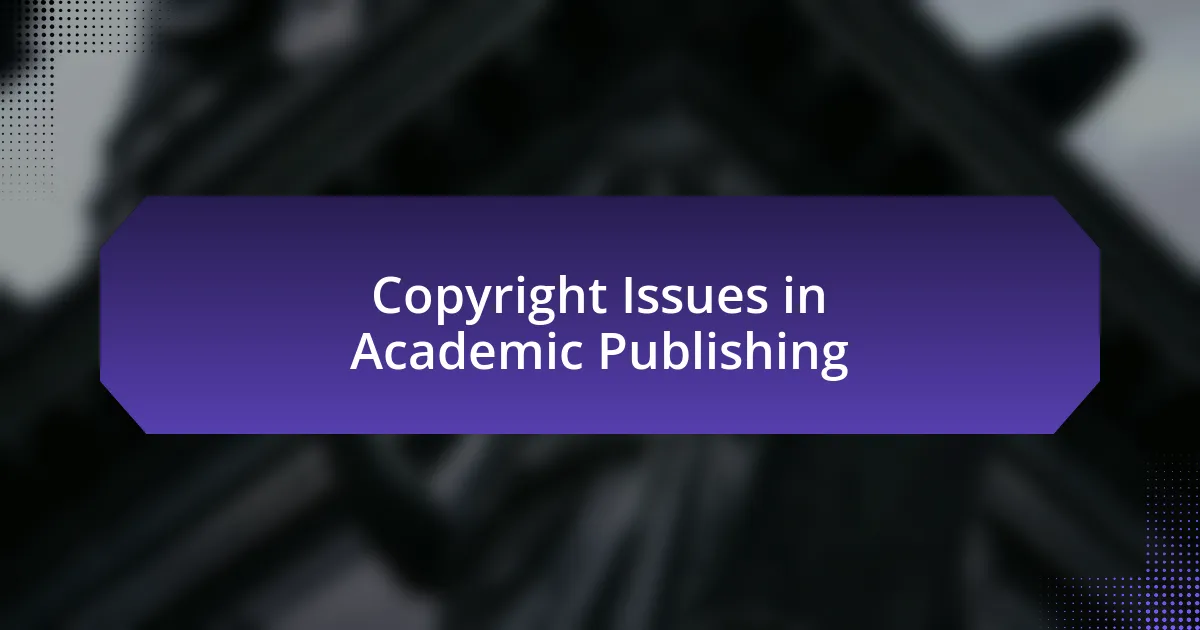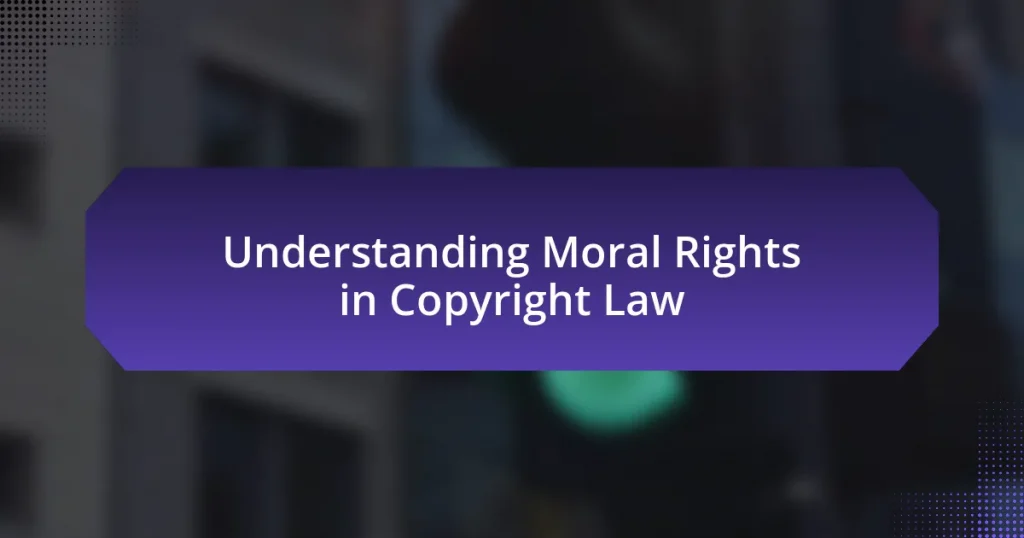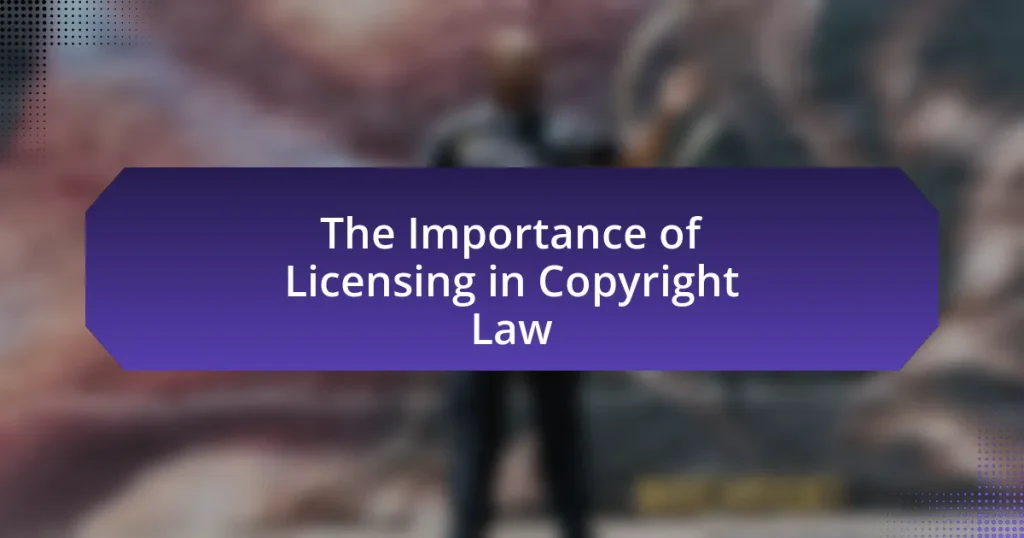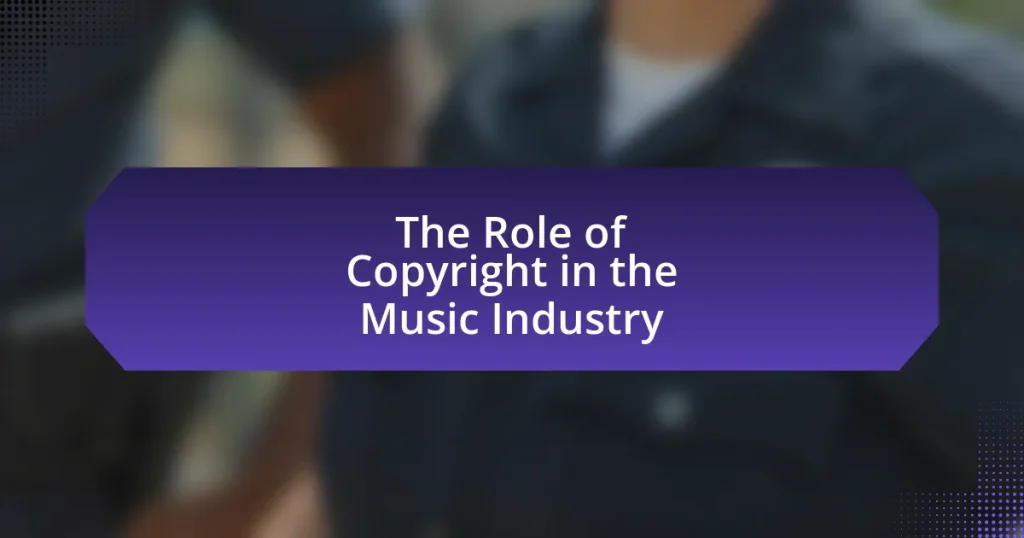Copyright issues in academic publishing encompass the ownership and rights associated with scholarly works, affecting authors, publishers, and institutions. The article explores the complexities of copyright law, including the transfer of rights from authors to publishers, the implications for open access initiatives, and the challenges authors face in navigating ownership and licensing. Key principles of copyright law, such as fair use and the protection of original works, are discussed, along with the role of publishers in managing copyright agreements. Additionally, the article addresses common misconceptions about copyright in academia, the impact on academic collaboration, and best practices for authors to protect their rights while ensuring compliance with copyright regulations.
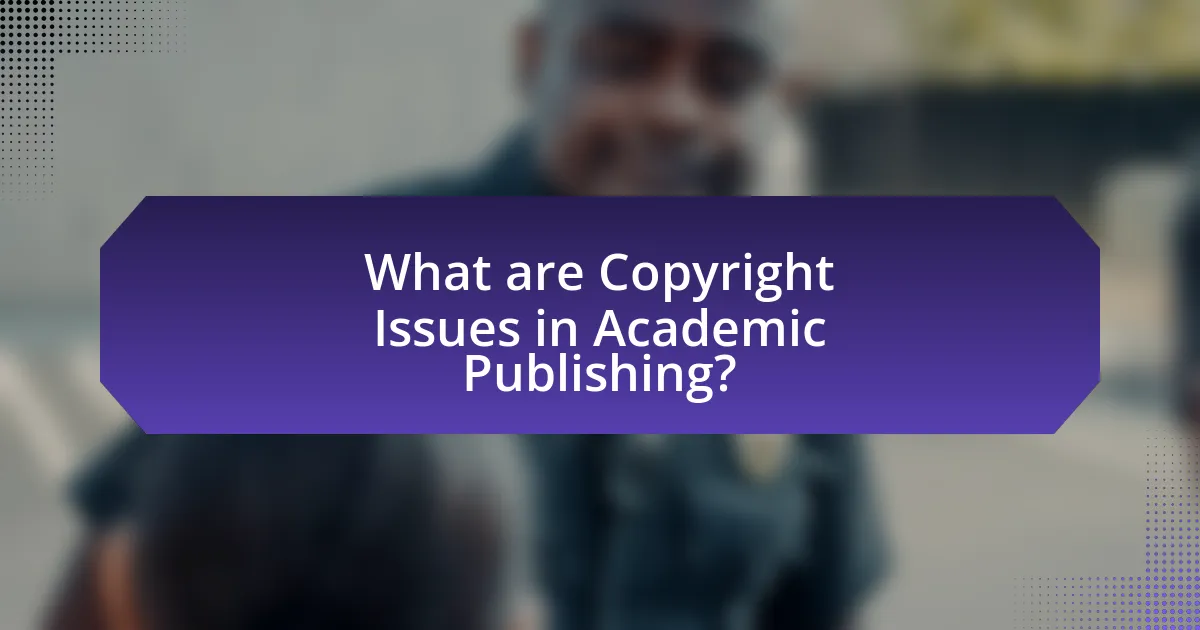
What are Copyright Issues in Academic Publishing?
Copyright issues in academic publishing primarily involve the ownership and rights associated with scholarly works. These issues arise when authors, publishers, and institutions navigate the complexities of copyright law, which governs the reproduction, distribution, and adaptation of published materials. For instance, many academic journals require authors to transfer copyright to the publisher, limiting the authors’ ability to share their work freely. This practice can hinder open access initiatives and restrict the dissemination of knowledge. Additionally, the use of copyrighted materials, such as images or text from other works, necessitates obtaining permissions, which can complicate the publication process. The American Association of University Professors highlights that these copyright transfers can lead to conflicts between the interests of authors and publishers, impacting the accessibility of research findings.
Why is copyright important in academic publishing?
Copyright is important in academic publishing because it protects the intellectual property rights of authors and ensures that they receive recognition and compensation for their work. This legal framework allows researchers to control how their findings are disseminated and used, fostering an environment that encourages innovation and scholarly communication. For instance, according to the Association of American Publishers, copyright enables authors to retain rights over their work, which can lead to increased visibility and citation rates, ultimately benefiting the academic community.
What are the key principles of copyright law relevant to academic publishing?
The key principles of copyright law relevant to academic publishing include the protection of original works, the rights of authors, and the concept of fair use. Copyright law safeguards the expression of ideas in academic works, ensuring that authors retain exclusive rights to reproduce, distribute, and display their creations. This legal framework allows authors to control how their work is used and prevents unauthorized use by others. Fair use, a critical aspect of copyright, permits limited use of copyrighted material without permission for purposes such as criticism, comment, news reporting, teaching, scholarship, or research, provided it meets specific criteria. These principles are essential for maintaining the integrity of academic work and fostering a culture of sharing knowledge while respecting intellectual property rights.
How does copyright protect authors and their works?
Copyright protects authors and their works by granting them exclusive rights to reproduce, distribute, and display their creations. This legal framework ensures that authors can control how their works are used and can benefit financially from their intellectual property. For instance, under the U.S. Copyright Act of 1976, authors automatically receive copyright protection upon the creation of an original work, which includes literary, musical, and artistic expressions. This protection lasts for the life of the author plus 70 years, allowing authors or their heirs to manage the rights and royalties associated with the work.
What challenges do authors face regarding copyright?
Authors face significant challenges regarding copyright, primarily related to ownership, licensing, and the complexities of fair use. Ownership issues arise when authors must navigate the transfer of rights to publishers, often relinquishing control over their work. Licensing challenges include understanding the terms under which their work can be used or shared, which can vary widely among different publishers. Additionally, the concept of fair use is often ambiguous, leading to uncertainty about how much of their own work or others’ works can be utilized without infringing copyright. These challenges are compounded by the rapid evolution of digital publishing and the varying copyright laws across jurisdictions, making it difficult for authors to protect their intellectual property effectively.
How do copyright laws vary across different countries?
Copyright laws vary significantly across different countries due to differences in legal frameworks, cultural attitudes towards intellectual property, and international treaties. For instance, the United States follows the Copyright Act of 1976, which grants authors exclusive rights for the life of the author plus 70 years, while the European Union adheres to the EU Copyright Directive, which emphasizes the protection of authors’ rights and includes provisions for fair use and exceptions. Additionally, countries like India have their own Copyright Act of 1957, which includes specific provisions for educational use and fair dealing. These variations can affect how academic works are published and shared internationally, as compliance with local laws is essential for legal protection and enforcement.
What are common misconceptions about copyright in academia?
Common misconceptions about copyright in academia include the belief that all academic work is automatically in the public domain, that fair use allows unlimited copying of materials, and that authors retain full rights to their work after publication. Academic work is not automatically public domain; copyright protection applies unless explicitly waived. Fair use is limited and context-dependent, allowing only specific uses without permission. Additionally, many academic publishers require authors to transfer copyright, meaning authors may not retain all rights to their work post-publication. These misconceptions can lead to unauthorized use of materials and confusion regarding rights and responsibilities in academic publishing.
What role do publishers play in copyright issues?
Publishers play a crucial role in copyright issues by managing the rights associated with academic works. They typically acquire copyright from authors, which allows them to control the distribution, reproduction, and adaptation of the content. This control is essential for ensuring that the publisher can monetize the work through sales and subscriptions, thereby funding the publication process. Additionally, publishers are responsible for enforcing copyright, which includes taking action against unauthorized use or infringement of the works they publish. For instance, the Association of American Publishers reported that copyright enforcement is vital for protecting the interests of authors and publishers alike, ensuring that creators receive fair compensation for their intellectual property.
How do publishers manage copyright agreements with authors?
Publishers manage copyright agreements with authors by drafting contracts that outline the rights and responsibilities of both parties. These contracts typically specify the extent of copyright transfer, including whether the author retains certain rights, such as the right to use their work in teaching or self-archiving. Publishers often utilize standard agreements that comply with legal frameworks and industry norms, ensuring clarity and protection for both authors and themselves. For instance, many publishers follow the guidelines set by organizations like the Association of American Publishers, which advocate for fair practices in copyright management.
What are the implications of copyright transfer agreements?
Copyright transfer agreements have significant implications for authors, publishers, and the dissemination of knowledge. These agreements typically transfer the copyright ownership from the author to the publisher, which can limit the author’s ability to share their work freely. For instance, once an author signs a copyright transfer agreement, they may lose the right to post their work on personal websites or institutional repositories without the publisher’s permission. This can restrict access to research findings, impacting the overall visibility and reach of the work. Furthermore, such agreements can affect the author’s ability to reuse their own content in future publications or teaching materials, thereby influencing academic collaboration and innovation. The implications extend to the academic community as well, as restricted access can hinder the advancement of knowledge and the principle of open science.
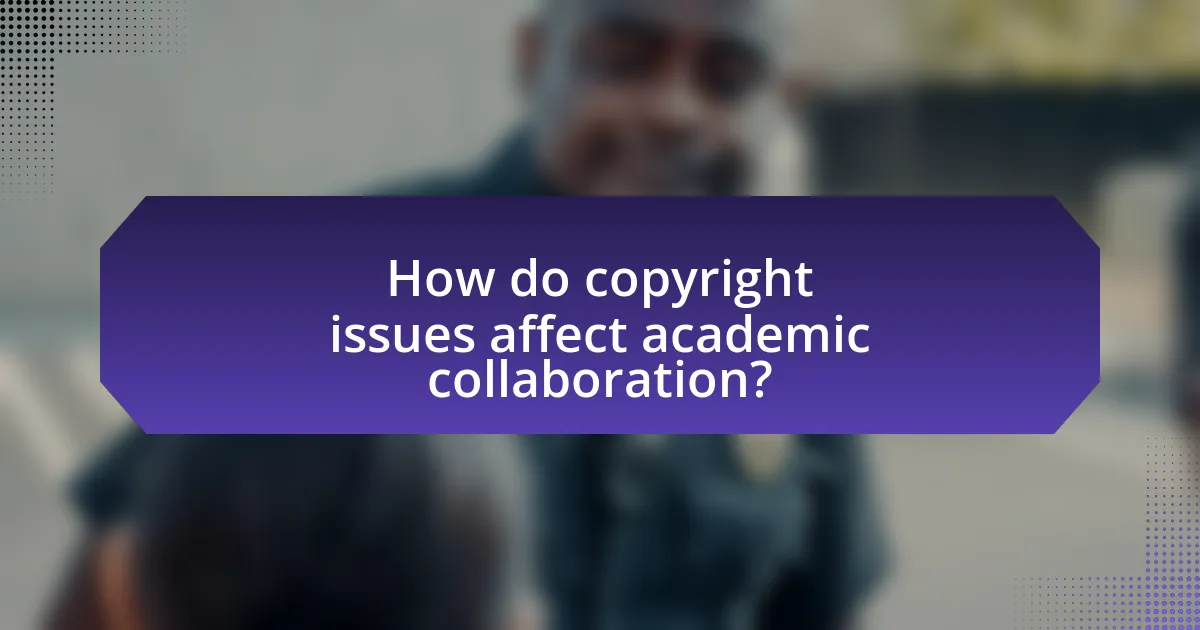
How do copyright issues affect academic collaboration?
Copyright issues significantly hinder academic collaboration by creating barriers to sharing and using research materials. When researchers are restricted by copyright laws, they may face limitations in accessing, reproducing, or distributing scholarly works, which can stifle collaborative efforts. For instance, a study published in the journal “Research Policy” by authors such as David W. McKenzie and others highlights that copyright restrictions can lead to reduced data sharing among researchers, ultimately impacting the quality and scope of collaborative projects. This limitation can result in duplicated efforts, wasted resources, and a slower pace of innovation in academia.
What are the implications of copyright on collaborative research?
Copyright significantly impacts collaborative research by determining the ownership and usage rights of the intellectual property generated during the research process. In collaborative settings, multiple authors may contribute to a work, leading to complexities in copyright ownership, as each contributor may have different rights based on their agreements or institutional policies. For instance, if researchers do not establish clear agreements regarding copyright before starting their collaboration, disputes may arise over who holds the rights to publish, share, or monetize the research findings. Additionally, copyright laws can restrict the ability to share data and findings openly, which is often essential for collaborative efforts. According to the U.S. Copyright Office, works created by multiple authors are typically considered joint works, meaning that all authors must agree on how the work is used, which can complicate the dissemination of research results.
How can researchers navigate copyright when co-authoring papers?
Researchers can navigate copyright when co-authoring papers by clearly defining authorship agreements and understanding the copyright policies of the journals they intend to submit to. Establishing a written agreement among co-authors regarding the ownership of the work and the rights to use the content is essential, as it helps prevent disputes later on. Additionally, researchers should familiarize themselves with the specific copyright terms of the target journal, as many journals require authors to transfer copyright upon publication or offer different licensing options, such as Creative Commons licenses. Understanding these policies ensures that all authors are aware of their rights and obligations, facilitating smoother collaboration and publication processes.
What strategies can be employed to ensure compliance with copyright in collaborative projects?
To ensure compliance with copyright in collaborative projects, establishing clear agreements regarding the ownership and use of intellectual property is essential. These agreements should outline the rights and responsibilities of each collaborator, specifying how contributions will be attributed and how the final work can be used. Additionally, implementing a system for tracking the sources of all materials used in the project, including permissions for any copyrighted content, helps maintain compliance. Research indicates that projects with well-defined copyright policies experience fewer disputes and misunderstandings, thereby enhancing collaboration efficiency.
How does copyright impact the sharing of academic work?
Copyright significantly restricts the sharing of academic work by granting exclusive rights to authors and publishers over their intellectual property. This exclusivity means that researchers often cannot freely distribute their own work without permission, which can hinder collaboration and the dissemination of knowledge. For instance, many academic journals require authors to transfer copyright upon publication, limiting the authors’ ability to share their work in institutional repositories or on personal websites. According to a study by the Scholarly Publishing and Academic Resources Coalition (SPARC), approximately 80% of academic articles are published under restrictive copyright agreements, which directly impacts the accessibility of research findings.
What are the limitations of sharing copyrighted materials in academic settings?
Sharing copyrighted materials in academic settings is limited by legal restrictions, specifically copyright law, which protects the rights of creators. These limitations include the requirement for permission from copyright holders to reproduce or distribute their works, which can hinder access to essential resources for research and education. Additionally, the doctrine of fair use allows limited use of copyrighted materials without permission, but its application is often ambiguous and context-dependent, leading to uncertainty about what constitutes fair use in academic contexts. Furthermore, institutional policies may impose additional restrictions on sharing copyrighted materials, complicating compliance for educators and researchers.
How can authors legally share their work while respecting copyright?
Authors can legally share their work while respecting copyright by utilizing Creative Commons licenses, which allow them to specify the terms under which their work can be shared and reused. These licenses provide a clear framework that enables authors to retain certain rights while permitting others to use their work under specified conditions, such as attribution or non-commercial use. According to the Creative Commons organization, over 1.4 billion works are licensed under these terms, demonstrating their widespread acceptance and effectiveness in balancing copyright protection with sharing. Additionally, authors can share their work through institutional repositories or preprint servers that comply with copyright laws, ensuring that their rights are maintained while still making their research accessible to the public.
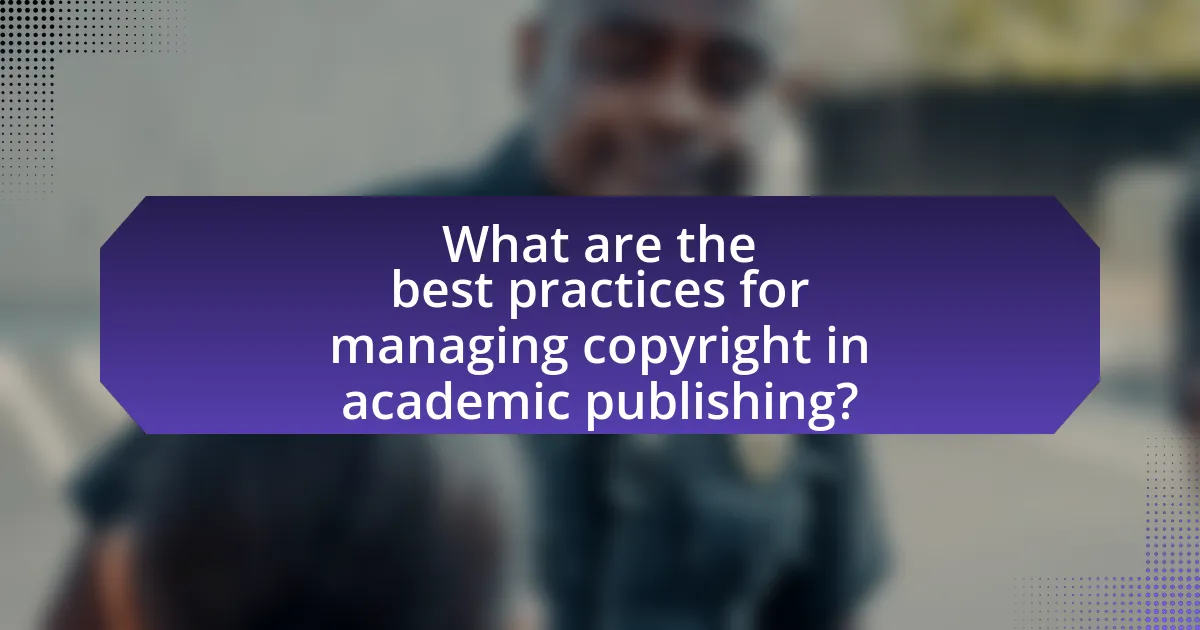
What are the best practices for managing copyright in academic publishing?
The best practices for managing copyright in academic publishing include obtaining clear permissions for the use of copyrighted materials, ensuring proper attribution to original authors, and utilizing open access licensing when possible. Clear permissions prevent legal disputes and ensure compliance with copyright laws, while proper attribution acknowledges the contributions of original authors, fostering academic integrity. Open access licensing, such as Creative Commons, allows for broader dissemination of research while maintaining copyright control, promoting collaboration and accessibility in the academic community. These practices are essential for maintaining ethical standards and protecting intellectual property rights in academic publishing.
How can authors protect their copyright effectively?
Authors can protect their copyright effectively by registering their works with the U.S. Copyright Office, which provides legal evidence of ownership and the ability to sue for infringement. Registration is a formal process that establishes a public record of the copyright and is required before an author can file a lawsuit for infringement. Additionally, authors should include copyright notices on their works, which inform the public of their rights and deter unauthorized use. According to the U.S. Copyright Office, registration also allows authors to claim statutory damages and attorney’s fees in litigation, enhancing their legal protection.
What steps should authors take before submitting their work for publication?
Authors should conduct a thorough review of their manuscript before submitting it for publication. This includes ensuring that the work adheres to the specific guidelines of the target journal, verifying that all references are correctly cited, and confirming that the manuscript is free of grammatical and typographical errors. Additionally, authors must check for any copyright issues, such as obtaining permission for any third-party content used and ensuring that their work does not infringe on existing copyrights. According to the Committee on Publication Ethics, proper citation and permission practices are essential to avoid legal complications and to uphold academic integrity.
How can authors ensure they retain rights to their work after publication?
Authors can ensure they retain rights to their work after publication by negotiating the terms of their publishing agreements. Many publishers offer options for authors to retain certain rights, such as the right to share their work in repositories or use it for teaching purposes. For instance, authors can request to retain copyright ownership or opt for a Creative Commons license, which allows for specific uses while maintaining some rights. Research indicates that authors who are proactive in discussing rights during the submission process are more likely to secure favorable terms, as seen in studies by the Association of American Publishers, which highlight the importance of understanding and negotiating publishing contracts.
What resources are available for understanding copyright in academia?
Resources available for understanding copyright in academia include the U.S. Copyright Office, which provides comprehensive guidelines and FAQs on copyright law, specifically tailored for educational institutions. Additionally, the Association of American Universities offers resources and best practices for managing copyright in research and teaching. The Creative Commons organization provides licenses that help academics share their work while retaining certain rights, and their website includes educational materials on copyright implications. Furthermore, many universities have dedicated copyright offices or librarians who can assist with specific questions and provide workshops on copyright issues. These resources collectively support academics in navigating copyright complexities effectively.
Where can authors find guidance on copyright issues in academic publishing?
Authors can find guidance on copyright issues in academic publishing through resources such as the Copyright Clearance Center, which provides comprehensive information on copyright laws and licensing options. Additionally, many academic publishers offer specific guidelines on their websites regarding copyright policies and author rights. For instance, the Association of American Publishers provides resources that clarify copyright issues relevant to academic authors. These resources are essential for understanding the legal aspects of publishing and ensuring compliance with copyright regulations.
What organizations provide support for copyright education in academia?
Organizations that provide support for copyright education in academia include the Association of Research Libraries (ARL), the American Library Association (ALA), and the Copyright Clearance Center (CCC). These organizations offer resources, training, and guidance on copyright issues relevant to academic institutions. For instance, ARL focuses on advancing research libraries and provides tools for understanding copyright in the context of scholarly communication. ALA offers educational materials and workshops to help librarians and educators navigate copyright laws. CCC provides licensing solutions and educational resources to facilitate copyright compliance in academic settings.
What practical tips can authors follow to avoid copyright issues?
Authors can avoid copyright issues by ensuring they obtain permission for any third-party content they wish to use, such as images, text, or data. This practice is essential because using copyrighted material without authorization can lead to legal disputes and potential penalties. Additionally, authors should familiarize themselves with fair use guidelines, which allow limited use of copyrighted material under specific circumstances, such as for criticism, comment, news reporting, teaching, scholarship, or research. Furthermore, authors should consider using original content or materials that are in the public domain or licensed under Creative Commons, as these options typically do not require permission. Keeping thorough records of permissions and licenses can also help authors demonstrate compliance with copyright laws.
